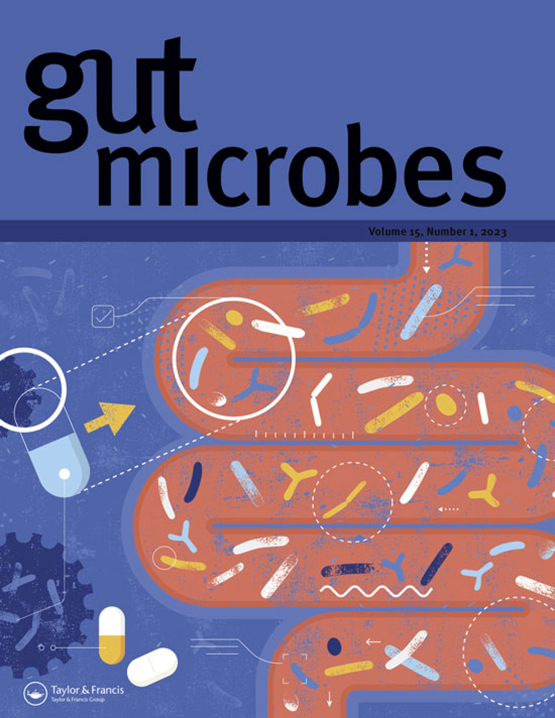Submit a Manuscript to the Journal
Gut Microbes
For an Article Collection on
The gut microbiome in obesity
Manuscript deadline


Article collection guest advisor(s)
Dr. Jonathan Jacobs,
University of California, Los Angeles (UCLA), USA
JJacobs@mednet.ucla.edu
Dr. Arpana Church,
University of California, Los Angeles (UCLA), USA
ArpanaChurch@mednet.ucla.edu
The gut microbiome in obesity
Obesity is commonly defined as body-mass index (BMI) greater than 30 kg/m2 and is believed to be driven by a complex interplay of genetics, diet, and environmental factors. In the past two decades, considerable evidence from human and animal model studies has supported a critical role for the gut microbiome in the development and treatment of obesity. This has included seminal studies demonstrating differences in microbial composition between obese individual and lean controls, transmissibility of obesity via the microbiome in animal models, genetic models of obesity that were attributable to microbial dysbiosis, microbiome change as a mechanistic intermediate in the effect of obesity interventions including bariatric surgery, and obesogenic or anti-obesity effects of individual candidate microbes in animal models. However, much remains unknown about the shared microbial features (taxonomic and functional) that drive obesity across human populations and the mechanisms by which microbes can modulate obesity. These have been proposed to include increased energy harvest from food, lipid uptake, intestinal permeability, and adipose tissue inflammation, as well as altered signalling to the brain to modulate ingestive behavior and central metabolic regulation. There is therefore a critical need to further investigate the gut microbiome in obesity and elucidate pathways underlying this relationship.
Obesity has greatly increased in prevalence in recent decades across the world, which has had profound health consequences. Adverse health outcomes of obesity include associated metabolic disturbances such as diabetes, fatty liver disease, and cardiovascular disease as well as a wide range of other conditions including many cancers. Recognition of the critical role of the microbiome as a driver of obesity has led to great insights into how environmental factors such as diet and antibiotic exposure could drive the epidemic of obesity. Improved understanding of the role of the microbiome in obesity offers the potential for novel therapeutic strategies to treat obesity that can build upon lifestyle interventions and medications, potentially with wide-ranging health benefits.
This article collection will cover the full scope of research investigating the gut microbiome in the pathogenesis and treatment of obesity. The following subtopics will be highlighted:
- Multi-omics characterization of the human obesity-associated microbiome –potentially in conjunction with the host metabolic and inflammatory response – using technologies including metagenomics, metatranscriptomics, host transcriptomics, proteomics, and metabolomics.
- Specific obesity-related host-microbe interactions that are elucidated in animal models and/or in vitro models incorporating microbes and host cells.
- Brain-gut-microbiome pathways affecting obesity that are supported by human studies – potentially incorporating neuroimaging – and/or demonstrated in mechanistic animal model experiments.
- Microbiome directed interventions for obesity including diet, prebiotics, and live biotherapeutic products that are studied in animal models or clinical trials.
Original research articles, reviews, and meta-analyses are welcome.
Keywords
- Multi-omics
- Host-microbe interactions
- Brain-gut-microbiome
- Dietary intervention
- Live biotherapeutic
All manuscripts submitted to this Article Collection will undergo a full peer-review; the Guest Advisor for this Collection will not be handling the manuscripts (unless they are an Editorial Board member).
Please review the journal scope and author submission instructions prior to submitting a manuscript.
The deadline for submitting manuscripts is 1 February 2026.
Please contact Zhiyuan Zhang at zhiyuan.zhang@taylorandfrancis.com with any queries and discount codes regarding this Article Collection.
Please be sure to select the appropriate Article Collection from the drop-down menu in the submission system.
Guest Advisors
Dr. Jonathan Jacobs is a gastroenterologist and microbiome scientist who serves as co-Director of the Goodman-Luskin Microbiome Center at UCLA. His research investigates host-microbiome interactions in gastrointestinal, metabolic, and inflammatory disorders. He has published over 100 original research articles and reviews in scientific journals including Gut Microbes, Gut, Gastroenterology, Microbiome, Cell Host & Microbe, Genome Medicine, Cellular and Molecular Gastroenterology and Hepatology, and Proceedings of the National Academy of Science. His ongoing projects employ multi’omics analysis of patient cohorts and gnotobiotic experimental models to characterize microbes and microbial products that promote obesity and inflammatory bowel disease.
Dr. Arpana Church is the co-director of the Goodman-Luskin Microbiome Center at UCLA. Her current research focuses on the interactions between environmental and biological factors in shaping brain-gut microbiome signatures associated with stress-based diseases such as obesity. Broadly defined, her research aims to integrate two systems (the brain and the gut) in order to better understand the underlying mechanisms associated with obesity and altered consumption behaviors. Backed by the National Instituted for Health (NIH), Dr. Church’s goal is to develop a comprehensive model that provides a powerful biomarker that will increase diagnostics around obesity in an effort to improve overall health outcomes. Building on the success of her lab in the area of adversity and obesity, Dr. Church recently received two major grants from NIMHD and NIA on investigating the brain-gut microbiome interactions associated with obesity. She has also received several industry funded grants as the Principal Investigator in addition to publishing over one hundred peer-reviewed articles, which have been featured in mainstream media outlets such as the Today Show, NBC, WSJ, Science, and WebMD.
Benefits of publishing open access within Taylor & Francis
Global marketing and publicity, ensuring your research reaches the people you want it to.
Article Collections bring together the latest research on hot topics from influential researchers across the globe.
Rigorous peer review for every open access article.
Rapid online publication allowing you to share your work quickly.
Submission Instructions
All manuscripts submitted to this Article Collection will undergo desk assessment and peer-review as part of our standard editorial process. Guest Advisors for this collection will not be involved in peer-reviewing manuscripts unless they are an existing member of the Editorial Board. Please review the journal Aims and Scope and author submission instructions prior to submitting a manuscript.
